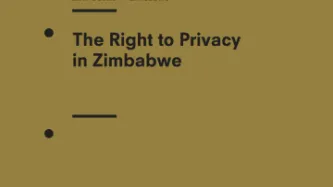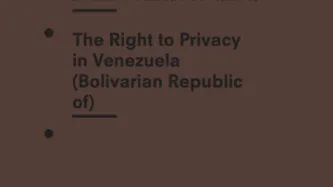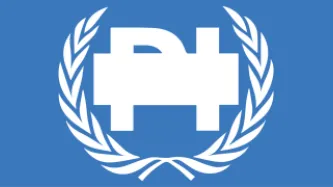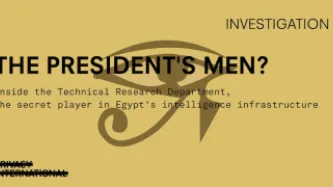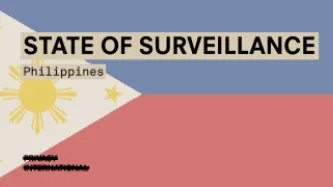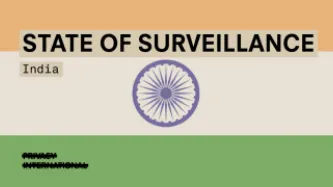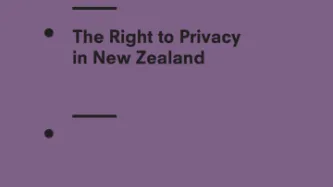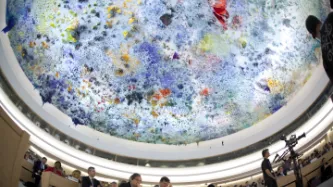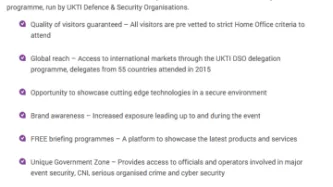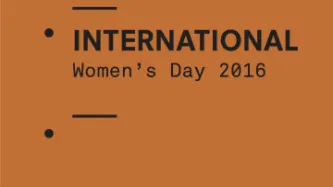Advanced Search
Content Type: Advocacy
This Universal Periodic Review (UPR) stakeholder report is a submission by Privacy International (PI), the International Human Rights Clinic at Harvard Law School (IHRC), the Zimbabwe Human Rights NGO Forum(the Forum), and the Digital Society of Zimbabwe (DSZ).
Content Type: Advocacy
This Universal Periodic Review (UPR) stakeholder report is a submission by Privacy International (PI), the International Human Rights Clinic at Harvard Law School (IHRC), and Acceso Libre.
Content Type: News & Analysis
Macedonia's capital Skopje is bracing itself for another night of protests and clashes after the interim President announced on Tuesday that there will be an amnesty for everyone under investigation in a formal probe into illegal wiretapping.
The investigation into the wiretapping scandal, which was the focus of Privacy International's report released last month, Macedonia: Society on Tap, also focused on other serious crimes, including electoral fraud, blackmail and the torture of a…
Content Type: Press release
The committee of data protection regulators across Europe, the Working Party 29, announced today its opinion on the current “Privacy Shield”. The Opinion is expected shortly, and based on the statements made by the Working Party chair in a press conference, we understand that the Working Party, while noting improvements from the annulled “Safe Harbor” agreement, has serious concerns about a range of aspects of the current "Privacy Shield" agreement with the U.S.
Overall they note the…
Content Type: News & Analysis
Image source
This is a guest post by Zoë Blackler.
If you want to know how the UK came to be the most watched nation in the world, with CCTV on every corner, you need to go back to 1942: the now ubiquitous policing aid was first developed for use in missile testing by the German military.
Tear gas, GPS trackers, pain rays, and surveillance drones - technologies developed by the military for use against foreign enemies have a habit of finding their way into the hands…
Content Type: Press release
Tomorrow, Privacy International and Open Rights Group will argue that wholesale and indiscriminate retention of our personal data is not permissible. The case, brought by MPs Tom Watson and David Davis against the Data Retention and Investigatory Powers Act 2014 (DRIPA), and in which PI intervened, will be heard in the European Court of Justice (CJEU) on 12 April. It has the potential to send shockwaves through the Investigatory Powers Bill, the controversial…
Content Type: News & Analysis
Should the European Union agree to legitimise trade with a country that refuses to adhere to European legal standards? This is the fundamental question that will be addressed at tomorrow’s meeting among European privacy regulators when they publish their opinion on the data-sharing agreement known as the ‘Privacy Shield’, the replacement to the failed ‘Safe Harbour’ agreement.
Background
Many of the world’s largest companies, such as Google and Facebook, store their customers’ data in…
Content Type: News & Analysis
Section 217 and the Draft Code of Practice on Interception of Communications
Tech giants including Apple Inc, Facebook Inc, Google Inc, Microsoft Corp, Twitter Inc and Yahoo Inc have been openly critical of the UK Government’s Investigatory Power Bill (IPBill). However, what has not been highlighted is a deeply concerning Draft Code of Practice on Interception on Communications, which will not only affect telecommunications companies small and large, but result in costs to the…
Content Type: News & Analysis
PI's full analysis can be read here
On 29 February 2016, the European Commission and the US government released the details of the proposed EU-U.S. “Privacy Shield”. The “Privacy Shield” replaces the now defunct so-called “Safe Harbor”.
The Privacy Shield is in fact a significant number of documents from various parts of the U.S. administration, which merely outline the existing, weak U.S. safeguards applicable to personal data of EU citizens. These documents are…
Content Type: Advocacy
Introduction
On 29 February 2016, the European Commission and the US government released the details of the proposed EU-U.S. “Privacy Shield”. The “Privacy Shield” replaces the now defunct so-called “Safe Harbor”.
The Privacy Shield is in fact a significant number of documents from various parts of the U.S. administration, which merely outline the existing, weak U.S. safeguards applicable to personal data of EU citizens. These documents are meant to serve as the basis for an “adequacy”…
Content Type: News & Analysis
We already know that in some countries, like the UK, governments are drafting laws to legalise and legitimise their incredible surveillance powers. In the U.S. we are seeing legislation that is using remarkably similar language on encryption and surveillance. The next phase of the cryptowars has openly begun.
Yesterday what is being called the Feinstein-Burr decryption Bill was introduced into the US Senate and leaked online. Whilst the short title ‘Compliance with Court Orders…
Content Type: News & Analysis
Hacking Team, an Italian surveillance company selling intrusive spyware to government authorities around the world, has had its global export license revoked by the Italian export authorities, according to a report in Il Fatto Quotidiano.
The move comes after intensive media scrutiny spurred by the hack of their internal systems last summer and revelations that they had sold surveillance technology to some of the world’s most authoritarian states.
One of the countries to which Hacking…
Content Type: News & Analysis
We do agree with Ramon Fonseca about one thing: that “Each person has a right to privacy, whether they are a king or a beggar.”
But that’s where our commonality with co-founder of disgraced Panama law firm Mossack Fonseca ends.
Last year, a whistleblower leaked 11.5 million documents about the firm’s business brokering offshore companies, details of which were published yesterday. Reportedly the largest leak in journalistic history, the cache reveals hidden assets by a dozen current and…
Content Type: News & Analysis
This week the UN Human Rights Committee has issued recommendations to the Governments of Namibia, New Zealand, Rwanda, South Africa, and Sweden to reform and strengthen surveillance and privacy protections.
The Committee recommendations touch upon some of the fundamental issues of surveillance powers and the right to privacy, including mass surveillance, retention of communication data, judicial authorisation, transparency, oversight, and regulating intelligence sharing.
These recommendations…
Content Type: News & Analysis
This article originally appeared in Indepedent Voices here.
Since the horrific Brussels and Istanbul attacks we've all looked at our daily lives and saw vulnerability and risk. Where else could terrorists attack?
We begin to formulate security responses. CCTV, communication, surveillance, identity cards - they aren't panning out. Perhaps we need to take things to the next level? How about we build an uber anti-terrorism system that grinds all our data together and identifies the people…
Content Type: News & Analysis
Following the launch of our report "The President’s Men?" shedding light on the existence of the Technical Research Department, a secret unit within the Egyptian intelligence infrastructure we publish here an open letter we have sent to President Abdel Fattah el-Sisi demanding that he responds to the extremely worrying situation we describe in the report.
Your Excellency President Abdel-Fattah El-Sisi,
On Wednesday 24th February we released a new investigation about the Technical…
Content Type: Long Read
This guest piece was written by Jessamine Pacis of the Foundation for Media Alternatives. It does not necessarily reflect the views or position of Privacy International.
Introduction
With a history immersed in years of colonialism and tainted by martial law, Philippine society is no stranger to surveillance. Even now, tales of past regimes tracking their citizens’ every move find their way into people’s everyday conversations. This, for the most part, has kept Filipinos…
Content Type: Long Read
Written by: Centre for Internet and Society
This guest piece was written by representatives of the Centre for Internet and Society (CIS). It does not necessarily reflect the views or position of Privacy International.
Introduction
As part of the State of the Surveillance project, CIS conducted a review of surveillance law, policy, projects, and trends in India. Below we provide a snap shot of key legal provisions governing surveillance in India and touch on…
Content Type: Long Read
“This is my personal opinion,” concedes Branko, a taxi driver in Skopje, the Republic of Macedonia's capital. “It was done by America to stop Putin building his gas pipe line through Macedonia.”
“This is just politics,” he advises, skeptically.
It's a common reaction to the wiretapping scandal in Macedonia. Beginning in February last year when opposition leader Zoran Zaev posted a series of wiretaps online that he called 'bombs' – they seemingly showed that for years the phone calls of some…
Content Type: Long Read
The recent back and forth between Apple and the FBI over security measures in place to prevent unauthorised access to data has highlighted the gulf in understanding of security between technologists and law enforcement. Modern debates around security do not just involve the state and the individual, the private sector plays a very real role too. There are worrying implications for the safety and security of our devices. Today, a new company stepped in to this discussion -- though it had been…
Content Type: News & Analysis
This is a guest post by Jasna Koteska. Read Privacy International's full report documenting stories of mass surveillance in Macedonia here.
What are the main similarities and differences between modern surveillance methods in Macedonia and those of the socialist period?
In all 46 years of communist Macedonia, the total official number of personal communist surveillance files is 14,572. Unofficial sources report more than 50,000 files. The number of direct 'snitches' in communist…
Content Type: News & Analysis
If you were to buy ‘Anna Karenina’ online, you would be told that people who bought Tolstoy’s classic also bought Dostoevsky’s ‘Crime and Punishment’. But if you've just read an 848 page epic Russian novel, do you really want your follow up to be a 1,008 page epic Russian novel? Maybe you want to read something very different next, maybe some contemporary American short stories, such as ’No one belongs here more than you’ by Miranda July? But you know, I don't think the…
Content Type: Report
Privacy International notes New Zealand’s written replies to the list of issues prior to reporting in relation to the New Zealand’s laws, policies and practices related to interception of personal communications.
A review of the security and intelligence legislation is currently underway in accordance with the Intelligence and Security Committee Act. It is expected that the Parliament will consider the review in 2016. Hence this represents a significant opportunity to amend the current…
Content Type: News & Analysis
We are on the verge of a revolution in government surveillance powers.
Previously it was simple. Governments demanded access to our homes. Then our communications. Then they demanded access to whatever companies held on us. Then they complained that technology was making this harder, and demanded that technology be designed for them. With every step, safeguards were reduced.
Next governments will demand that companies betray their users and use our technologies to compromise us.
In…
Content Type: News & Analysis
This article originally appeared in The Guardian's Comment Is Free section.
News of the legal dispute between Apple and the FBI has made headlines across the world. The dispute stems from the FBI’s investigation of the 2015 mass shooting in San Bernardino, California. As part of its investigation, the FBI obtained an iPhone used by one of the deceased shooters, Syed Farook. The data on the iPhone is encrypted and the FBI wants Apple to create new software that…
Content Type: News & Analysis
Privacy International and ARTICLE 19 last week submitted to members of the Parliament of Ghana's Defence and Interior Committee calling for it to abandon rushing through a controversial new surveillance Bill. The Interception of Postal Packets and Telecommunication Messages Bill (2015) allows the interception of all communications for the undefined purposes of “protecting national security” and “fighting crime generally.” Announced on February 19th 2016, the committee in charge of pushing it…
Content Type: Press release
Today the Investigatory Powers Bill had its second reading in the House of Commons. Instead of listening to negative public response to the Bill, and evolving EU law precedent, the UK Government continues to fully advocate for the Bill's prompt passage through Parliament.
Privacy International Director of Campaigns, Harmit Kambo said:
"Today's second reading debate was a missed opportunity to put a brake on new surveillance powers that fundamentally shift the balance of power between…
Content Type: Advocacy
Below is Privacy International’s oral statement to the Human Rights Council 31st ordinary session, 9 March 2016 Inter-active dialogue with the UN Special Rapporteur on the right to privacy. Privacy International's written statement is here.
BEGIN
Mr. President,
Privacy International welcomes the opportunity to participate in this first inter-active dialogue with the Special Rapporteur on the right to privacy. We regret however the Rapporteur’s late submission of his report.…
Content Type: News & Analysis
Surveillance companies and government officials from across the world are gathering in the UK this week at the invitation of the Home Office for the UK’s “Premier Security and Law Enforcement Event’, one week after the controversial spying legislation, entitled the Investigatory Powers Bill, had its first reading in Parliament.
Delegates and companies will be attending the three-day long ‘Security and Policing’ trade show in Farnborough, the historical centre of the UK’s aerospace industry.…
Content Type: Report
The right to privacy is a qualified right. Gender is not and cannot be its qualification.
For this year’s International Women’s Day, the Privacy International Network is sharing some of its successes as well as the challenges and opportunities we face in at the intersection of gender issues and the right to privacy. Click here to see this feature.
Interferences and violations of the right to privacy, as described in the UN Declaration of Human Rights, affect society as a whole. However,…
